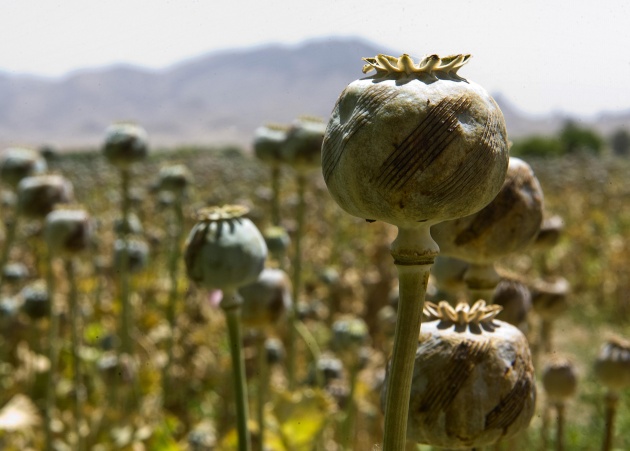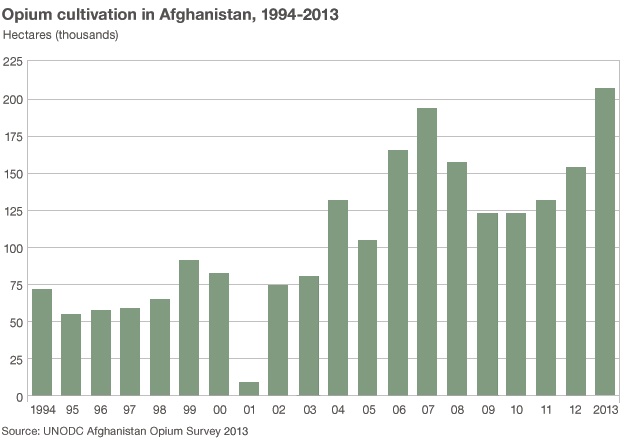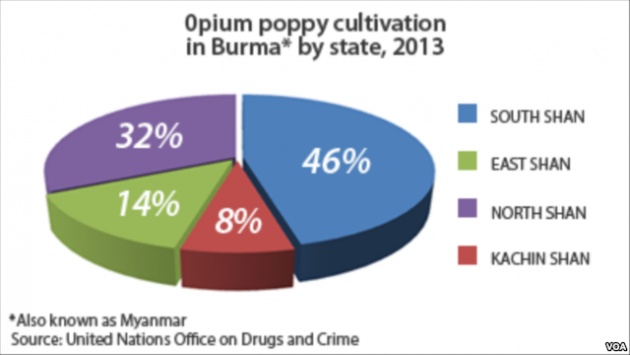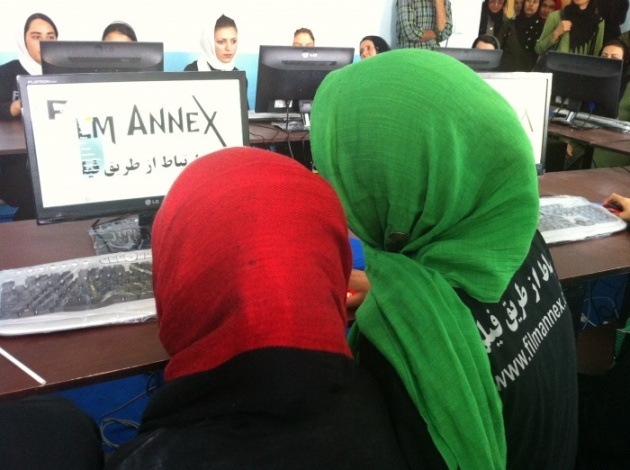
More than 90% or world's opium production comes from Afghanistan. Opium price has steadily increased during the past few years, and more and more Afghan farmers are harvesting the poppy, disregarding the risk that it entails. It has become such a remunerative business that the chance to be caught is well worth the reward, and these figures don't seem to decrease. It's true that the government police has intensified its efforts to eradicate the plantations, achieving a record number of arrests. However, opium production has intensified like never before, and it has been difficult to keep up with the criminals.

Primarily consumed under the form of heroin, Afghan's opium is reaching every corner of the world. The latest news about actor
Philip Seymour Hoffman's death are just an example of what the degree of damage this drug can cause to our system. Heroin consumption in the United States has increased during the past few years, and so has the number of deceases nationwide. Although these two countries are on opposite sides of the globe, there's no limit to how far international smugglers can deliver this poison.

Afghanistan is not the only country struggling to defeat opium harvesting.
Burma is now officially following its lead, and represents
the second nation in the world on the infamous opium-producers list. Many Burmese farmers can't compete with the increased costs of growing conventional products, and together with political instability and domestic conflicts with the government, many tribes living in isolated ares of the country have chosen to harvest opium to sustain their communities. In no way I want to justify their actions, but opium trafficking is a complex phenomenon that goes way beyond the simple stereotypical drug smuggler and his gang. Entire families depend on the production of this drug, and it would be just too convenient to blame it solely on them. It's easy to be judgmental with a roof on the head and food on the table. With a family to sustain and no other alternatives other than working in an opium farm, it would be very difficult to reject the offer.

Opium production thrives in areas lacking professional as well as educational opportunities. Afghanistan and Burma will not win their wars against this cancer by just fighting its effects. They need to tackle the source of the problem, eliminating the reason their citizens are choosing this way of life. Also, they need help from the outside, but the international community is failing to provide viable options for the Afghan and Burmese populations to abandon the harvesting of this product. To the contrary, the so called "developed countries" can't even prevent the drug from entering their jurisdictions, generating the demand that is the sole reason opium is produced in the first place.

I don't mean to know what it takes to solve the opium problem, as there are just too many factors to comprehend playing a role. Nevertheless, I applaud every effort made but public and private enterprises around the world to offer the Afghan and Burmese communities an alternative to working in the opium farms. For instance,
Film Annex is currently building
Internet classrooms in
Herat, the third largest city in Afghanistan, improving the
Afghan education system, and connecting tens of thousands
Afghan girls and boys to the cyberspace. This means more professional outcomes for them and their families, and fewer chances of joining the opium business. Since this company rewards users for their contribution on its website, Film Annex's writers can
make money blogging on the website, and generate earnings superior to the wage national average.

Film Annex's endeavor is just a small step, but it's showing unimaginable results. If it's model were implemented on a larger scale, countless individuals around the world would benefit from this opportunity. Film Annex is using digital literacy as way out of an inefficient education system and a stagnant economy. The rewards offered in real time by this digital platform are real, and could be used as an inspiring example for any international developer interested to positively affect the future of Afghanistan and other countries.
* * * * * * * * * * * * * * * * * * * * *
If you want to write blogs but are not registered with Film Annex yet, REGISTER HERE and start your journey. You will be joining a family of writers coming from all over the world eager to read your stories. Writing on Film Annex is very easy: just click HERE and start your journey. As soon as you register, SUBSCRIBE to my page on Film Annex: you will be earning money in no time! :-)
If you are already writing on Film Annex, tell your friends to REGISTER HERE, and suggest that they should read this article: it will show them exactly what they need to do to write good blogs and be successful on Film Annex.
Would you like to know me more? Watch MY NEW INTERVIEW WITH FILM ANNEX, and learn my opinion about SOCIAL MEDIA and DIGITAL LITERACY around the world.
Are you curious about my background? Read MY FIRST INTERVIEW WITH FILM ANNEX.
Giacomo Cresti









